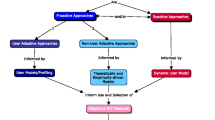Abstract
A host of negative emotions such as anxiety, frustration, and boredom inevitably occur during computerized learning. These emotions can have serious negative consequences on students’ metacognitive and cognitive processes and learning outcomes. Thus, students should be equipped with the ability to regulate these negative emotions in order to achieve positive learning outcomes. Building on previous research on learning-centered emotions, I (first author) propose a series of investigations into the ways in which emotion regulation strategies can be effectively implemented in an intelligent tutoring system. This paper discusses ongoing experiments, future plans, and the implications of the findings for the development of ITSs that aid in the regulation of students’ emotions.
Access this chapter
Tax calculation will be finalised at checkout
Purchases are for personal use only
Similar content being viewed by others
References
Csikszentmihalyi, M.: Flow: The psychology of optimal experience. Harper and Row, New York (1990)
D’Mello, S.K., Graesser, A.C.: Emotions during Learning with AutoTutor. In: Durlach, P., Lesgold, A. (eds.) Adaptive Technologies for Training and Education, Cambridge University Press, Cambridge (in press)
Linninbrink, L.A.: The role of affect in student learning: A multi-dimensional approach to considering the interaction of affect, motivation, and engagement. In: Schutz, P.A., Pekrun, R. (eds.) Emotion in Education, pp. 13–36. Elsevier, Amsterdam (2007)
Conati, C., VanLehn, K.: Toward computer-based support of meta-cognitive skills: a computational framework to coach self-explanation. International Journal of Artificial Intelligence in Education 11, 398–415 (2000)
Graesser, A.C., Lu, S., Jackson, G.T., Mitchell, H., Ventura, M., Olney, A., Louwerse, M.: AutoTutor: A tutor with dialogue and natural language. Behavioral Research Methods, Instrumentation, and Computation 36, 180–193 (2004)
Aleven, V., Koedinger, K.: An effective metacognitive strategy: Learning by doing and explaining with a computer-based Cognitive Tutor. Cognitive Science 26, 149–179 (2002)
Gross, J.J., Thompson, R.A.: Emotional regulation: Conceptual foundations. In: Gross, J.J. (ed.) Handbook of Emotion Regulation, pp. 3–26. Guilford Press, New York (2007)
Chauncey Strain, A., D’Mello, S.: If you can’t change it, change the way you think about it: Training on the use of emotion regulation strategies during learning. Poster Presentated at the 15th International Conference on Artificial Intelligence in Education, Christchurch, New Zealand (2011)
Author information
Authors and Affiliations
Editor information
Editors and Affiliations
Rights and permissions
Copyright information
© 2011 Springer-Verlag Berlin Heidelberg
About this paper
Cite this paper
Strain, A.C., D’Mello, S.K., Graesser, A.C. (2011). Training Emotion Regulation Strategies During Computerized Learning: A Method for Improving Learner Self-Regulation. In: Biswas, G., Bull, S., Kay, J., Mitrovic, A. (eds) Artificial Intelligence in Education. AIED 2011. Lecture Notes in Computer Science(), vol 6738. Springer, Berlin, Heidelberg. https://doi.org/10.1007/978-3-642-21869-9_119
Download citation
DOI: https://doi.org/10.1007/978-3-642-21869-9_119
Publisher Name: Springer, Berlin, Heidelberg
Print ISBN: 978-3-642-21868-2
Online ISBN: 978-3-642-21869-9
eBook Packages: Computer ScienceComputer Science (R0)




